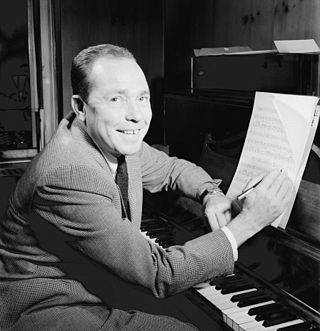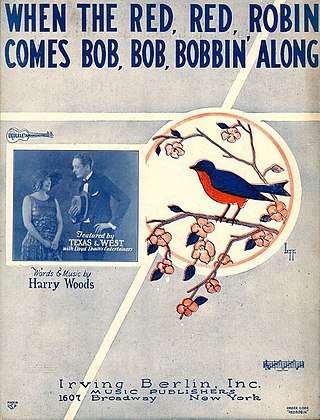Related Research Articles

John Herndon Mercer was an American lyricist, songwriter, and singer, as well as a record label executive who co-founded Capitol Records with music industry businessmen Buddy DeSylva and Glenn E. Wallichs.

Harry Warren was an American composer and the first major American songwriter to write primarily for film. He was nominated for the Academy Award for Best Original Song eleven times and won three Oscars for composing "Lullaby of Broadway", "You'll Never Know" and "On the Atchison, Topeka and the Santa Fe". He wrote the music for the first blockbuster film musical, 42nd Street, choreographed by Busby Berkeley, with whom he would collaborate on many musical films.

"What Is This Thing Called Love?" is a 1929 popular song written by Cole Porter, for the musical Wake Up and Dream. It was originally published by Harms and first performed by Elsie Carlisle in March 1929. The song has become a popular jazz standard and one of Porter's most often played compositions.
"On the Atchison, Topeka and the Santa Fe" is a popular song written by Harry Warren with lyrics by Johnny Mercer. The song was published in 1944, spanned the hit chart in mid-1945, and won the 1946 Academy Award for Best Original Song, the first win for Mercer.

Swing Easy! is the eighth studio album by Frank Sinatra. It was released in 1954 as a 10" album and consisted of only eight songs, as each side of the record only allowed approximately fourteen minutes of music.
"On the Sunny Side of the Street" is a 1930 song composed by Jimmy McHugh with lyrics by Dorothy Fields. Some authors say that Fats Waller was the composer, but he sold the rights to the song. It was introduced in the Broadway musical Lew Leslie's International Revue starring Harry Richman and Gertrude Lawrence.
"Stars Fell on Alabama" is a 1934 jazz standard composed by Frank Perkins with lyrics by Mitchell Parish.
"P.S. I Love You" is a popular song with music by Gordon Jenkins and lyrics by Johnny Mercer. published in 1934.
"Zip-a-Dee-Doo-Dah" is a song composed by Allie Wrubel with lyrics by Ray Gilbert for the Disney 1946 live action and animated movie Song of the South, sung by James Baskett. For "Zip-a-Dee-Doo-Dah", the film won the Academy Award for Best Original Song and was the second Disney song to win this award, after "When You Wish upon a Star" from Pinocchio (1940). In 2004, it finished at number 47 in AFI's 100 Years...100 Songs, a survey of top tunes in American cinema.
"Skylark" is an American popular song with lyrics by Johnny Mercer (1909-1976), and music by Hoagy Carmichael (1899-1981), published in 1941.
"Pennies from Heaven" is a 1936 American popular song with music by Arthur Johnston and lyrics by Johnny Burke. It was introduced by Bing Crosby with Georgie Stoll and his Orchestra in the 1936 film of the same name.

"Peek-a-Boo" is a song by English rock band Siouxsie and the Banshees. It was released in 1988 as the first single from the band's ninth studio album, Peepshow. Melody Maker described the song as "a brightly unexpected mixture of black steel and pop disturbance" and qualified its genre as "thirties hip hop". "Peek-a-Boo" was rated "Single of the Week" in both Sounds and NME. Sounds wrote that it was a "brave move", "playful and mysterious". NME described it as "Oriental marching band hip hop" with "catchy accordion." They then said : "If this nation was served by anything approaching a decent pop radio station, "Peek A Boo" would be a huge hit."
"I Gotta Right to Sing the Blues" is a popular song with music by Harold Arlen and lyrics by Ted Koehler, published in 1932 for the Broadway show Earl Carroll's Vanities (1932). The song has become a jazz and blues standard. Popular recordings in 1933 and 1934 were those by Cab Calloway, Louis Armstrong and Benny Goodman.
"Don't Get Around Much Anymore" is a jazz standard written by composer Duke Ellington. The song was originally entitled "Never No Lament" and was first recorded by Duke Ellington and his orchestra on May 4, 1940. "Don't Get Around Much Anymore" quickly became a hit after Bob Russell wrote its lyrics in 1942.

"Down Among the Sheltering Palms" is a popular song.
"What's New?" is a 1939 popular song composed by Bob Haggart, with lyrics by Johnny Burke. It was originally an instrumental tune titled "I'm Free" by Haggart in 1938, when Haggart was a member of Bob Crosby and His Orchestra. The tune was written with a trumpet solo, meant to showcase the talents of band-mate Billy Butterfield. Crosby's orchestra recorded "I'm Free" the same day it was written.

"Way Down Yonder in New Orleans" is a popular song with music by John Turner Layton Jr. and lyrics by Henry Creamer. First published in 1922, it was advertised by Creamer and Layton as "A Southern Song, without A Mammy, A Mule, Or A Moon", a dig at some of the Tin Pan Alley clichés of the era.

"When the Red, Red Robin " is a popular song written, both words and music, by Harry Woods in 1926. The song became the signature song for singer and actress Lillian Roth, who performed it often during the height of her musical career from the late 1920s to the late 1930s.

Going Places is a 1938 American musical comedy film directed by Ray Enright. Dick Powell plays a sporting goods salesman who is forced to pose as a famous horseman as part of his scheme to boost sales and gets entangled in his lies.
References
- 1 2 3 Furia, Philip; Patterson, Laurie (2010). The Songs of Hollywood. Oxford University Press. pp. 84–85. ISBN 978-0-19-533708-2.
- 1 2 3 "Music USA #7881-A, Interview with Johnny Mercer". 28 July 1976.
- ↑ "The 11th Academy Awards: 1939". oscars.org. Academy of Motion Picture Arts and Sciences. 3 October 2014. Retrieved July 18, 2020.
- ↑ Various; Adele Astaire; Al Jolson; Aretha Franklin; Barbara Cook; Barbra Streisand; Benny Goodman And His Orchestra; Bessie Smith; Billie Holiday (1984), American Popular Song: Six Decades Of Songwriters And Singers, Internet Archive, Smithsonian Collection, retrieved 2021-01-03
- ↑ Various; Al Jolson; Billie Holiday with Teddy Wilson & Orch.; Bing Crosby; Bobby Darin; Buddy Clark; Dick Haymes; Dinah Shore; Doris Day (1998), The Songs Of Harry Warren, Internet Archive, Warner/ Chappell Music, Inc., retrieved 2021-01-03
- ↑ Whitburn, Joel (1986). Joel Whitburn's Pop Memories 1890–1954 . Wisconsin: Record Research. p. 533. ISBN 0-89820-083-0.
- ↑ Combs, Paul (2012). Dameronia: The Life and Music of Tadd Dameron. The University of Michigan Press. p. 135. ISBN 978-0-472-02881-8.